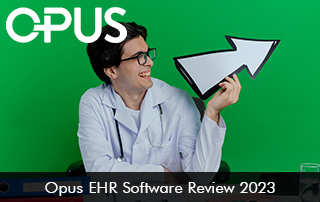Opus EHR Software has made significant waves in the healthcare industry as an innovative electronic health record system designed to streamline patient care, enhance clinical workflows, and improve overall healthcare efficiency. In this comprehensive review, we will delve into the key features and functionalities of Opus EHR, explore its potential benefits for healthcare providers, and assess its overall performance in meeting the evolving needs of modern healthcare settings. Whether you’re a healthcare professional seeking to optimize your practice or a patient interested in understanding how this software impacts your care, this review will provide valuable insights into Opus EHR’s capabilities and its impact on the healthcare landscape.
Key Features & Functionalities:
Opus EHR Software boasts a range of key features that contribute to its effectiveness and desirability in healthcare settings:
Adaptability & Customization:
The adaptability and customization features of Opus EHR make it a versatile choice for various healthcare specialties, like Primary Care, Specialist Practices, Mental Health,Pediatrics,OB/GYN (Obstetrics and Gynecology), Dentistry, Chiropractic, Ophthalmology, Physical Therapy, Rehabilitation and Long-Term Care – allowing healthcare providers to tailor the software to their specific needs and workflows, thereby enhancing the efficiency and quality of care in their respective fields.
Ease of Use:
Opus EHR boasts an intuitive user interface, making it easy for healthcare professionals to learn and use effectively. Its user-friendly design minimizes disruptions in patient care during the transition to EHR.
Interoperability:
The software supports interoperability, allowing healthcare providers to exchange patient information securely and seamlessly. This feature is crucial for coordinating care across different healthcare settings.
Clinical Decision Support:
Opus EHR offers clinical decision support tools that help healthcare providers make informed clinical decisions based on evidence-based guidelines, thereby enhancing patient safety and quality of care.
Patient Engagement:
The software includes a patient portal, enabling patients to schedule appointments, access medical records, and communicate with their healthcare providers. This empowers patients to take an active role in their healthcare journey.
Billing and Revenue Cycle Management:
Opus EHR streamlines billing and revenue cycle management, helping practices optimize financial operations, reduce claim denials, and increase revenue.
Reporting and Analytics:
Opus EHR provides robust reporting and analytics tools to help healthcare organizations assess their performance, identify trends, and make data-driven decisions.
Telehealth Support:
In response to the growing demand for telemedicine, Opus EHR often includes features that enable telehealth consultations and remote patient monitoring.
Mobile Access:
The availability of mobile applications enables healthcare professionals to access patient information and perform essential tasks from mobile devices, enhancing flexibility and responsiveness.
Potential Drawbacks
Cost:
EHR software, including Opus, can be a significant financial investment. Smaller practices may find the cost prohibitive. It’s essential to consider the pricing structure and long-term financial implications.
Learning Curve:
Implementing any new EHR system comes with a learning curve. While Opus EHR is designed for ease of use, it still requires time for healthcare professionals to become proficient, potentially affecting productivity initially.
Integration Challenges:
Users might encounter challenges when integrating Opus EHR with other third-party software systems. Successful integration depends on the existing IT infrastructure and technical expertise available within the practice.
Customer Support:
While Opus offers customer support, some users may experience delays in receiving assistance or face issues with response times. Effective and timely customer support is essential in healthcare settings.
Updates and Compliance:
Like any EHR software, Opus requires regular updates to stay compliant with evolving healthcare regulations. Keeping up with these updates can be demanding and may disrupt practice operations.
Careful consideration of your practice’s unique needs and priorities will help you determine if Opus EHR is the right fit for your healthcare management needs.







